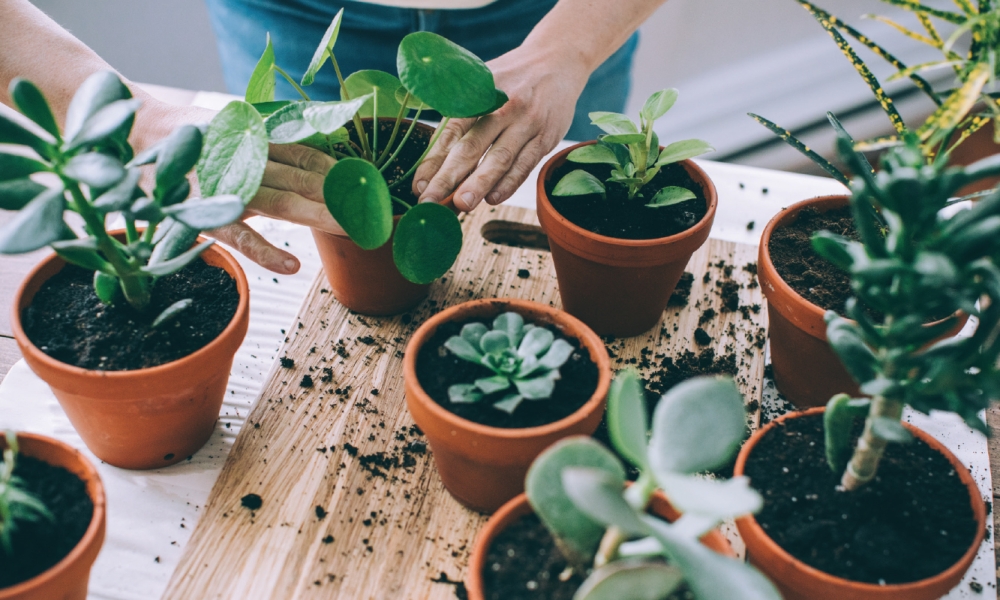
How will you grow in 2024?
I am an adult, and I have done hard things. I have helped a second grader with math homework, driven to a destination before GPS and installed a car seat without directions — if you know, you know. Yet I have never kept a plant alive for more than a couple weeks since a very durable bamboo shoot I had in college that, in hindsight, might have been plastic.
I am an adult, and I have done hard things. I have helped a second grader with math homework, driven to a destination before GPS and installed a car seat without directions — if you know, you know. Yet I have never kept a plant alive for more than a couple weeks since a very durable bamboo shoot I had in college that, in hindsight, might have been plastic.
It wasn’t because I haven’t tried. I optimistically bring potted plants home, water them and then find them wilted a week later when I remembered they were there. Like many, I planted several rows of seeds as a way to keep my kiddos occupied during the pandemic. The seeds sprouted and were then trampled when attention shifted from gardening to soccer.
This year I felt it was time to try again and decided to attempt growing a few herbs in pots on the porch. However, this time an internet search offered insight into my problematic planting history. All plants need water — but apparently not in the same way! Some prefer total saturation every few weeks. Some prefer consistently moist soil. Others even prefer “drought-like conditions.” There are such things as self-watering pots, and the internet said to be mindful of how much perlite (volcanic glass with a high water content) was in the soil.
I realized my prior strategy of pouring water everywhere when I happened to remember I had plants was probably the reason my greenery never stayed that way.
And, all too often, I take the same approach to my spiritual growth as I did to gardening — just hoping I remember, and then it all works out. As I prepare for a new year I’m reflecting that the same way I had to learn the different ways to care for the rosemary, basil, mint and thyme — the ones that haven’t died yet on the porch (thanks, direct sunlight!) — I can identify where I hope to grow in my relationship with God and plan accordingly.
In counseling we encourage clients to make SMART goals, and I think these offer great guidance for the spiritual life as well. SMART is an acronym that stands for Specific, Measurable, Attainable, Relevant and Time-bound.
Goals are specific when we identify what we hope to accomplish. A vague goal to “pray more” could be made specific by saying, “I will pray a decade of the rosary.” This goal could be measurable by assigning a time to it — like every day of the week, three times a week or every work day; an actual amount to accomplish beyond saying “more.” An attainable goal should be reasonable for the person setting it. An attainable goal for a religious sister or brother might be to pray 20 decades each day, an attainable goal for a mom of a toddler might be to pray 20 decades in two months.
Goals are relevant when they help us grow in ways that are important to us. For example, maybe in reading the above paragraph you thought, “I already pray the rosary every day, but I really want to read my Bible more.” So a relevant goal would be, “I’ll read one chapter of the Bible every morning before breakfast.”
Finally, it’s good for goals to be time bound. I find a month is often a good start. This isn’t to say that in a month the prayer stops, rather the goal can be examined after a month. We might conclude, “This is working well. I’m going to read two chapters this month,” or reflect, “This habit of prayer is helping me to feel more peace. I’m going to continue this exactly as I’ve done for another month.” Time-bound goals have often kept me from giving up too quickly — a commitment to just a month helps me get past the initial discomfort of a new experience.
The new year is a great opportunity to set goals in our spiritual life, but the best progress happens when we consider what we need most and make a plan to accomplish it.
Alison Blanchet lives in Panama City with her husband and three children. She works as a therapist for children and teens. Email her at alisondblanchet@gmail.com.



